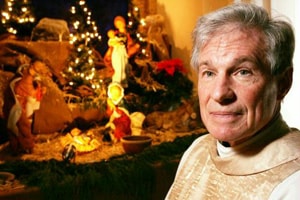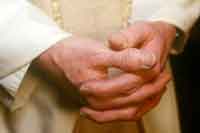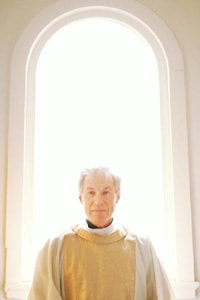A Priest’s Confession
“I knew at a very early age that I was different.”
 THE PRIEST’S heart was pounding in his chest. His hands were icy cold.
THE PRIEST’S heart was pounding in his chest. His hands were icy cold.
He was nervous. More than usual. The pews were nearly full as they are most Sundays as he walked up the middle aisle of St. Joseph Basilica in Alameda to celebrate Mass.
It was just after 9 a.m. Children squirmed and latecomers slid into their seats as the morning light poured in through the stained-glass images of Mary, Jesus, Joseph and the saints.
Going through the ritualistic motions of Mass, the priest struggled in his mind with the decision he had made. It’s the time, he thought. It’s the right place, the right people.
The parishioners sang and repeated the customary “amens” and “also with you” replies to pre-selected texts.
Just another Sunday Mass.
Then the priest started to speak.
The topic of his homily that early fall day, as dictated by Catholic hierarchy, was accepting, not rejecting.
So the priest told a story. It went something like this.
About two years ago his aunt was dying. As a priest and as her nephew, he arrived at her deathbed.
He sat next to her and she started to cry, finally telling the priest, her nephew, she was gay.
“I’m so afraid I’m going to hell,” the priest remembered her saying.
“That’s not how God works,” he replied.
Perhaps parishioners weren’t surprised by the priest’s story that day.
Homosexuality within the Catholic Church had been in the news lately. The Vatican was scheduled to release a letter within weeks stating its position on whether gay men should enter the seminary and become priests.
The pope’s position on homosexuality, however, had been defined within church teachings for some time. The condition is an anomaly, according to the Vatican. Furthermore, gay men and women are objectively disordered and homosexual acts are considered a serious depravity.
The priest continued with his homily.
He grasped a large book in his hands, raising the ornate Gospel over his head.
“This good news is for everybody or it is for nobody,” he told his congregation.
The Gospel has to be for his aunt, too. For all lesbians and gays, the priest said with conviction.
How did he know?
The answer was simple.
“I’m one of you,” Father Rich Danyluk said.
Four small words
The four small words echoed off the walls of the basilica that Sunday morning.
 Did he just say what I think he said? Some parishioners thought to themselves, glancing at others around them.
Did he just say what I think he said? Some parishioners thought to themselves, glancing at others around them.
He had.
Father Rich Danyluk, a priest for 30 years, in the middle of Mass, had said he was gay.
He had told his aunt two years before and now had told the world.
Alameda is not nearly the most liberal town in the left-leaning Bay Area. It is an island unto its own, with quirky politics and a stubborn small-town sensibility in the middle of a vast metropolitan setting. It is not the first place one might look to find an admittedly gay priest. San Francisco, Berkeley, maybe.
Yet even in those bastions of sexual acceptance, gay priests celebrate Mass, care for the sick and tend to their flocks – all in anonymity. In California and across the country, estimates vary on how many priests are gay – ranging from 10 to 60 percent.
Other priests usually know who they are. The bishops are often privy. And sexually confused parishioners seeking priestly solace are sometimes in on the secret.
But a priest in his robes, standing before God and the congregation in the middle of Mass, admitting he’s gay? It just doesn’t happen.
Well, hardly ever.
At three separate Masses that September Sunday, Father Rich shared his sexual orientation with those who came to worship.
At the evening Mass, the small sentence fell on the congregation. There wasn’t the same hesitation as in the earlier Masses. Instead, the basilica erupted in applause, and pew by pew the parishioners stood.
Their priest was homosexual and they greeted the news with a standing ovation.
Born in Bethlehem
Rich Danyluk was born in Bethlehem, Pa., on Dec. 23, 1947.
“You’re almost Jesus,” a small boy once told him after learning of his almost-Jesus birthplace and date.
Father Rich, 58, laughs when he tells that story.
By age 13 or 14, maybe younger, Father Rich said he knew the truth: He was gay.
“I knew at a very early age that I was different,” he said.
He doesn’t smile when he tells that story. He was a gay Catholic boy in a blue-collar East Coast industrial town.
And yet, God called him anyway.
In 1967 he entered the St. Charles Seminary in Philadelphia. But Father Rich’s first foray into the priesthood was a failure. He was kicked out for failing Latin and Greek – concluding his instructors thought he didn’t have the brains to be a priest.
He went to work in an orphanage instead. There, co-workers, including nuns, thought he should try again and encouraged a visiting priest to talk to him.
Father Rich was persuaded and entered the Congregation of the Sacred Hearts of Jesus and Mary, falling under the authority of the religious order rather than a diocese.
There, he didn’t have to learn archaic languages, and while he still struggled in his studies – always has, he noted – he was ordained Aug. 23, 1975.
The question
The question hangs in the air. It’s a hard one to ask when sitting next to a priest in his office, religious icons on the walls.
Father Rich awaits the question.
One would guess he’s used to people struggling to say what they must say when confessing sins or seeking advice.
He waits. Silent.
“How could you?” the question starts before stopping.
“Why would you?” and again a pause.
Finally: “How can you, a gay man, work for an institution that loathes and condemns a part of who you are?”
Father Rich smiles.
“There’s a difference sometimes (between) serving the Church and serving Christ,” he says. “There’s a higher voice that I hear.”
“This is a human institution,” he adds later. “There are times when we do it well, wonderfully well. We’ve done things poorly.
“Perhaps it’s a bit like family. You might have the dysfunctional grandfather, a crazy uncle or two. But you love them anyway, devoted to the idea of family and maybe what it could be.”
Father Rich explains it another way. He gets up from his seat to find a piece of paper a friend gave him.
“For all the Catholic hate, I experience here a community of love,” it reads in part. “For all the institutional idiocy, I find here a tradition of reason. For all the individual repressions, I breathe here an air of freedom. … For all the apparent absence of God, I sense here the real presence of Christ.”
The piece of paper seems to answer the awkward question for Father Rich.
“We’re broken people,” he says. “It’s a broken institution. It’s the broken body of Christ.”
Just plain Rich
Father Rich has a business card. It doesn’t say priest.
Just Rich Danyluk, address, contact information.
But printed on the back is The Serenity Prayer: “God grant me the serenity to accept the things I cannot change, courage to change the things I can and wisdom to know the difference.”
The words serenity, courage and wisdom are in large, bold letters.
For most of his life, voices of authority told Father Rich he was objectively disordered. Sometimes, they used different words:
Abnormal or wrong
Homosexuality is a troubling moral and social phenomenon, according to the Vatican documents.
In 2003, the Vatican’s Congregation for the Doctrine of Faith issued the following position:
“Sacred Scripture condemns homosexual acts ‘as a serious depravity, …'” the document says, citing Romans 1:24-27; 1 Corinthians 6:10 and 1 Timothy 1:10. “This judgment of Scripture does not, of course, permit us to conclude that all those who suffer from this anomaly are personally responsible for it, but it does attest to the fact that homosexual acts are intrinsically disordered.”
In other words, gays can’t help being gay, but it goes against the natural order anyway.
As the Vatican prepared in late fall to release its instruction regarding gays in seminary, the topic appeared frequently in the press.
Some articles said the timing of the instruction seemed suspect – coming so closely on the heels of the pedophile scandals plaguing the U.S. Catholic Church. The implication was that either the Vatican wanted to deflect attention from the scandals by focusing on gay seminarians or that perhaps the Vatican was drawing a connection between pedophile priests and gay priests.
For Father Rich, the daily barrage of articles debating whether gay men could be priests got to be too much.
“One can only take so much of hearing how disordered you are,” Father Rich said in an interview with the Herald several weeks after the September Mass in which he shared his secret. “I wasn’t baptized a disordered child of God. I was baptized like everyone else.”
A tough decision
The decision to share his sexual orientation during Mass wasn’t a political move or a personal protest, Father Rich said.
He struggled with the decision.
He was going to tell his parishioners in Mass something he has never even told his beloved 85-year-old father.
Father Rich didn’t want to use the pulpit for a personal confession. But he did want to proclaim the Gospel – good news – to gays and lesbians.
“Because I’m one of them,” Father Rich said in his office weeks later. “The only agenda I’m pushing is the Gospel.” 
It wasn’t the first time Father Rich had stood before a congregation during Mass to share a secret part of himself.
Six years ago in Southern California, Father Rich was arrested. He had been driving drunk.
He was removed from his parish in San Dimas and sent for three months to a recovery center for priests in Minnesota. Before he left, in his last homily, he stood before the congregation and told them he was an alcoholic.
He got a standing ovation that time, too.
Father Rich smiles at the memory.
“You’re clapping for a drunk priest,” he remembers telling them.
But he also remembers the tears in the eyes of grown men who embraced him after Mass, thanking him for his honesty, perhaps even seeing a bit of themselves in their fallible priest.
“I find our brokenness binds us more than perfection,” Father Rich said.
“I think the only thing we have to give each other is ourselves, he added. The only thing I have to offer people is myself. The Gospel through myself.”
Others like him
Father Rich doesn’t fear for his job. He trusts his congregation.
The bishop knows there are gay priests within the Oakland Diocese, he said. And he’s aware of the wonderful service they give in the lives of so many people.
Gay priests adhering to their vows are celibate. They celebrate Mass. They administer last rites to the dying and comfort the sick. They hear confessions and give absolution.
They look like priests. They act like priests. They’re priests.
Sister Sandra Schneiders was at the 7 p.m. Mass in which Father Rich said he was gay. She was among those who stood to applaud him. It was courageous, she said; he didn’t say it with anger or as a way to bash the church.
He just said it, said Schneiders, a spirituality professor at the Jesuit School of Theology in Berkeley. As far as I’m concerned, he seemed to be saying, ‘I’ve done my best as a priest and this is how I’ll continue.'”
Earlier this month, more than three months after Father Rich told parishioners he was gay, a priest in Louisiana, the Rev. Jim Morrison, came out to his congregation.
He wanted to be honest with the parish, Morrison told the local paper. He encouraged their honesty in everything they did, and yet hadn’t been honest himself until now.
It is unlikely the untold number of gay priests working across the country will follow suit.
A few members of St. Joseph in Alameda left after Father Rich’s confession. The vast majority are firmly rooted behind him.
“I think Rich is thinking about the pain and suffering real people have who have experienced discrimination in society at large, and he’s saying God is with you in that,” said parishioner Robert Lassalle-Klein. “I can only say that the congregation is hearing him say, ‘God loves you as you are and accepts you as you are.'”
by Jill Tucker
published in the Oakland Tribune, Jan 22, 2006
Note from Mary: This article is Copywritten and used with Permission.
If you wish to reprint it, please contact the Author:
Jill Tucker at jtucker@angnewspapers.com